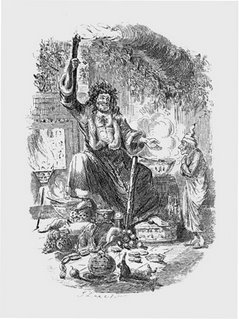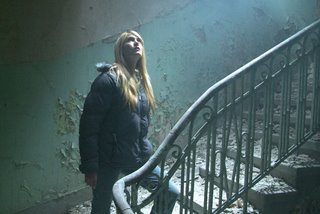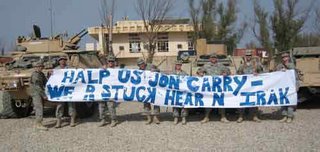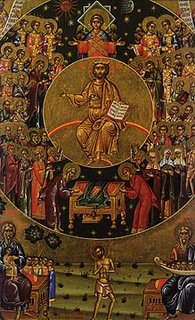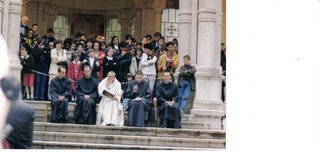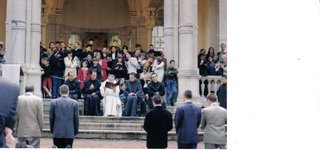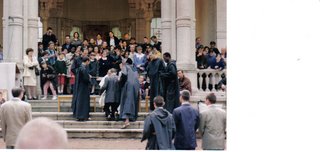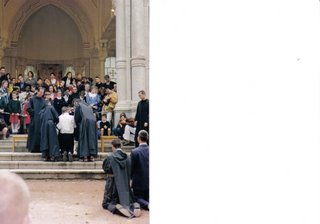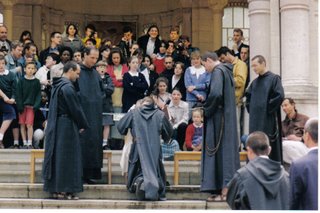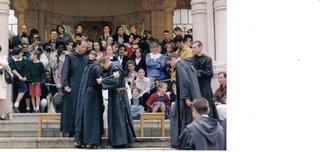Though I would like to post on St. John, the Disciple Whom Jesus Loved, I cannot. My dad is sick and in the hospital. Things are serious. Some time ago, I posted what follows. Sadly, I post it again. Please offer up your prayers for my dad who is ill and for my mom who is saintly in her care and strength. Perhaps join me in this:
 Each time I pray I am brought back to the story of the Healing of the Paralytic. You can find it in a few of the Gospels. Here is Mark's version (RSV):
Each time I pray I am brought back to the story of the Healing of the Paralytic. You can find it in a few of the Gospels. Here is Mark's version (RSV):Chapter 2
1 And when he returned to Capernaum after some days, it was reported that he was at home. 2 And many were gathered together, so that there was no longer room for them, not even about the door; and he was preaching the word to them.
3* And they came, bringing to him a paralytic carried by four men. 4 And when they could not get near him because of the crowd, they removed the roof above him; and when they had made an opening, they let down the pallet on which the paralytic lay.
5 And when Jesus saw their faith, he said to the paralytic, "My son, your sins are forgiven."
6 Now some of the scribes were sitting there, questioning in their hearts, 7 "Why does this man speak thus? It is blasphemy! Who can forgive sins but God alone?"
8 And immediately Jesus, perceiving in his spirit that they thus questioned within themselves, said to them, "Why do you question thus in your hearts? 9 Which is easier, to say to the paralytic, 'Your sins are forgiven,' or to say,' Rise, take up your pallet and walk? 10 But that you may know that the Son of man has authority on earth to forgive sins"--he said to the paralytic-- 11 "I say to you, rise, take up your pallet and go home."
12* And he rose, and immediately took up the pallet and went out before them all; so that they were all amazed and glorified God, saying, "We never saw anything like this!"
Now, what strikes me each time is signified by the choice of words. This choice on Jesus' part displays utter beauty and mercy on his part. And, let's add, a reason to hope. What am I talking about?
A man is paralyzed. Does he suggest going to Christ? No. His friends do. Man is sick. Friends take him to Christ. Simple. However, they can't get in. The house is packed. The place is full. Do they give up? Do they say, "Well, we tried"? No. They persist. Without ceasing, they--in a sort of prayer--continue to get their friend to the One they believe in. Does the friend say anything? Does the friend say he wants to go to Christ? No. The friend is sick and paralyzed. For whatever reason, he is quiet, as if he cannot talk, as if he is too sick to communicate his desires or voice his protests. Yet friends are friends. They will not be turned away. They will continue to do for a friend, for a loved one.
 The friends raise the paralytic up to the roof and lower him down through an opening, which they had to make on the spur of the moment.
The friends raise the paralytic up to the roof and lower him down through an opening, which they had to make on the spur of the moment.Now, the key, the word that always grabs me: "... their ..."
And when Jesus saw their faith, he said to the paralytic, "My son, your sins are forgiven."
We all remember that Jesus forgives the sins of the paralytic. As well, he soon heals the man of the paralysis. That is rather what we have come to expect from Jesus. But why? Why did Jesus do it?
Why did Jesus heal the paralytic? The text reveals the answer: "And when Jesus saw their faith, ..."
Their faith.
Jesus saw their faith and was moved. Jesus saw what they had done. Jesus saw that a group of believers in him loved a friend. Jesus saw that this group did not let crowds or a full building get in the way of transporting their friend to him. Jesus saw that this group risked to get their friend to him. They raised him up to the roof, made an opening, and lowered their paralyzed friend down into Jesus' midst.
They hoped for a healing. They got that and so much more.
Jesus was moved by "their faith." Because of their faith, he turned to the paralytic and forgave the man his sins. Jesus did not forgive him because of anything he (the paralytic) had said or done. No. Jesus forgave the man because of the man's friends. More precisely, Jesus acted because of the faith of the man's friends.
So, a group of believers took a sick or injured friend to Jesus and because of their faith, Jesus forgave the man his sins and then physically healed him.
Because of their faith, Jesus poured forth his mercy and graces upon the sick and injured.
We can help our friends and loved ones by carrying them to Jesus, not letting obstacles of whatever sort get in the way. Find another way when blocked. Find another means when things hinder you from bringing someone to Jesus. Raise him and then lower him onto the lap of Jesus. Lower him into the presence of the Lord. There, because of your faith, may Jesus see the sick and injured. May Jesus see and have mercy. May he save the sick and injured brought to him. May he even hear our prayer for physical healing. We may not get that one answered in the way we would like and when we would like, but in the end all mysteries will be made clear. On the more important note, Jesus has forgiven and saved the injured and sick brought to him by friends or loved ones who believe in his power, who believe in his mercy, who believe in his compassion, who truly and wholeheartedly trust and believe in Him.
Thus, we truly become "co-workers" with the Lord. We bring to him those in need of his grace. We bring to him and thus help him in the work of salvation, in the work of saving souls.
This is his beauty, his goodness, his mercy.
For those unable to do so on their own, Jesus leaves the sick and injured with friends and loved ones to intercede on their behalf, to be "co-workers" with him.
Because there are those who are unable to seek him on their own, Jesus leaves the sick and injured with us, with you and with me. To work, to pray on their behalf.
When petitioned out of hope and love, Jesus sees the faith of friends and loved ones who bring to him someone in need of the Lord's care. Because of this, "their faith," Jesus--we pray--will turn to the sick and injured, those who cannot come to him on their own because of their weak and frail state, and he will forgive them their sins, saving them, and then--in all hope and yet acceptance if it does not happen--he will once again utter those sought after words, "I say to you, rise, ... and go home."
 Please pray for my dad Leon as he struggles and fights to recover from this illness, that he may soon rise and come home. May God bless him and our family in these difficult times.
Please pray for my dad Leon as he struggles and fights to recover from this illness, that he may soon rise and come home. May God bless him and our family in these difficult times.




